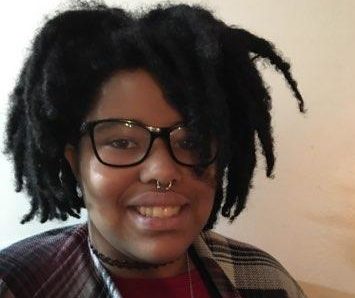First-Year Student Settles In at MCC
Windsor resident Lisa Chin did not see herself as a future college student a few years ago, but her high school guidance counselor suggested she start small at a community college. She had struggled in high school with undiagnosed ADHD, so she began this fall by taking just two required courses – English and math. She credits her peer mentor with giving her the guidance, practical skills and support she needed to start and become engaged with college.
Before enrolling at Manchester Community College, Chin had never finished an essay, she says. This semester, she has surprised herself by writing an essay a month. Her Achieve Hartford mentor, Isis Murillo Bravo, “gives me a lot of tips on how to start that kind of stuff.” Her mentor has taught her how to break the tasks up into manageable chunks from the time she receives the assignment and “not waiting until the last minute. In the past, I had to work against my
brain. My ADHD made me feel like I had to work twice as hard at something.”
Her mentor answered her questions and saw where she struggled. Bravo sat down with Chin and helped her create a time-management schedule for when to do homework for each class, she says. Her mentor taught her to review her completed essays for what worked and what didn’t and coached her on effective proofreading before handing essays in, Chin says.
Chin dropped out of high school and, after deciding a life in retail wasn’t for her, returned a few months later. At college, she says, she initially struggled with imposter syndrome. That changed when she began attending biweekly ‘tea time’ meetings with her mentor and other mentees. Through our Summer Transition and College Persistence programs in partnership with Capital and Manchester Community Colleges, we hire, train and supervise college students to work as peer mentors to first-year, mostly first-generation students. We serve graduates of public schools in Bloomfield, East Hartford, Hartford, Manchester, Vernon and Windsor; these programs began as ALL IN! Coalition Action Team pilot programs with Hartford students.
“Having that extra support and someone you can go to to ask questions so you don’t feel like you’re alone is really helpful. When you go to college, you’re alone. You don’t feel comfortable asking people for help. The tea time is really helpful. You get to meet people; you get out of your comfort zone,” she says. “I wish everybody had a mentor like Isis.”
With Bravo’s encouragement, she has been attending a campus National Alliance on Mental Illness (NAMI) chapter meetings and a roller-skating party. This has allowed her meet other first-semester students and get to know them. MCC held the New Student Orientation online as a series of sessions. “It was really refreshing to sit down and meet other students,” she says. “You get to talk to people who have the same interests as you.”
Bravo has also guided her through practical steps – helping her register for fall classes during the summer and, this fall, reminding her of the deadlines to submit the FAFSA and register for spring classes.
Having Bravo as her mentor “feels like a friend. You don’t feel like you’re talking to a mentor,” Chin says. “She’s played a really big role into me transitioning into MCC.”

